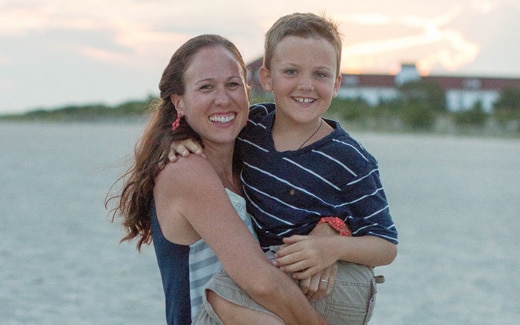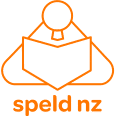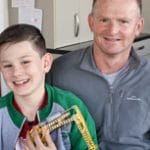Teaching Your Own Child With Dyslexia
What’s it like to teach your own child? Charis Sweeney trained with SPELD NZ so she could help her dyslexic son, Luke.
In 2017, I became the only SPELD NZ Teacher in Greymouth. I’m so grateful for the opportunity – I’ve grown as a professional in a myriad of ways and feel incredibly fortunate to be able to help my son and others in the community with specific learning disabilities (SLD).
I began to notice learning differences in Luke when he was four. He struggled with sequencing and naming, and when we played I-SPY and I suggested looking for something that started with a ‘B’ sound, he would respond with words like ‘tree’. Luke was very happy at preschool but when he started school his progress was slow and by the end of the first school year, he showed quite a bit of anxiety.

Charis and Luke
He was exhausted and often emotional. His teachers said he was “just a boy” and his ability was similar to others in the class; but they also noticed his lack of concentration and his anxiety. Luke would set high expectations for himself and become upset when he couldn’t meet them. It was hard for me to see a child who loved to learn about the world, loved books and being read to, and had so much confidence, change so dramatically in the course of the year.
A trip to a knowledgeable optometrist revealed a severe tracking issue. A friend who’s a dyslexia therapist in the USA advised that I not wait for him to fail, and encouraged me to have Luke assessed sooner rather than later. I’m so grateful for that advice. A formal assessment revealed what I instinctively knew. Luke is very bright and his general intelligence scores were very high, but the scores around phonological awareness, rapid naming, working memory, sequencing, and visual perception were very low.
Receiving his assessment inspired me to become a SPELD NZ teacher. I hoped that the online CCSLD course would give me the knowledge and understanding to help and advocate for my son, and I wasn’t disappointed!
Since working with Luke, I’ve seen some great improvements in his ability and self-belief. He is my most challenging student and I understand why many parents avoid taking on their own child! However, I work hard to teach around activities and methods I know Luke enjoys. Because he’s such a physical kid, we learn new words and vowel patterns by jumping to sounds and running to put new words together. He loves games so I’m constantly looking for or making up a game to teach something new.
We’ve also been bolstered by achieving goals. When Luke can do something he couldn’t do before, he becomes self-motivated to take on a new challenge. The key is letting him be in the driver’s seat as much as possible.
I now teach several other students and work at a Greymouth kindergarten part-time. As a SPELD NZ teacher, I think about the skills and knowledge the kindergarten children will need to be ready for school, such as phonological awareness, coordination/laterality, visual perception skills and a keen interest in learning. I try to plan some of the learning experiences with these in mind.
I’ve also initiated a local support group for parents of children with specific learning disabilities, which has been an amazing asset as both a parent and educator. We have a number of committed educators and professionals who’re passionate about helping their own children and other children in the community with SLDs. We’ve started a Facebook page, a kete of resources and a meeting each term, which have allowed us to discuss the challenges, frustrations, anxiety and celebrations we experience as parents of children with SLDs.
“If your child has changed emotionally and is struggling at school, don’t wait for an assessment. More knowledge about the way your child learns, their strengths and weaknesses and how their mind works, will always be an asset to their school journey and beyond.”






